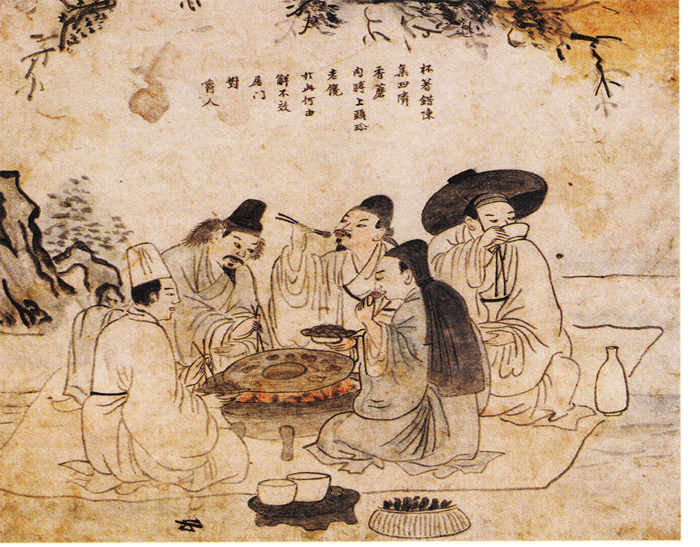The Rival Co Model 3150 Bzbq Beef
Asian America Daily - in under 5 minutes
What's happening in Asian America? Get a daily email to stay informed, educated, and entertained.
Editor's Note: This post was made in partnership with the amazing people over at Weee!
Korean barbeque, a popular way to eat and grill meat with family and friends, is embedded in a history of war, conquest and reclamation.
Ancient history: Molded by eras of conflict, KBBQ can be traced back to the Goguryeo era (37 B.C.–668 A.D.) with the creation of "maekjeok," or skewers roasted over a fire, which later turned into "bulgogi." The former came from the nomadic Maek tribe who lived in that era.

- Later in the Joseon Dynasty (1392–1910), "neobiani," or thin, marinated and charbroiled beef slices, emerged and were the royal's favorites, according to the Smithsonian Magazine.
- However, Buddhism influenced Korea for centuries (57 B.C.E.–668 C.E.), where it became the state religion and resulted in a ban on any meat-eating. "Banchan," or vegetable side dishes, were etched into Korean cuisine from that moment on.
- After the Mongol invasion (1231–1259) and Korea was subject to their rule, meat dishes were brought back into their food culture, according to Michael J. Pettid's "Korean Cuisine: An Illustrated History."
- During the Japanese invasion of Korea (1910–1945), meat shortages led to skyrocketing prices that eventually returned by the '90s.

Drinking culture: Alcoholic beverages have been paired with grilled dishes since before the Joseon era. Although Korean drinking culture and etiquette came about from "Sohak," or "Lesser Learning," during that time, according to the National Research Institute of Cultural Heritage's "Sul."

- Strict rules were set on how one should behave and be respectful when in a drinking setting based on factors like social class, gender and age.
- Regardless of classes, drinking was a time enjoyed by everyone from kings to servants.
- There is a Korean expression called "jujugaekban," which translates to "the owner asks the guest to have some liquor and the guest asks the owner to have some rice." Similar to "burying the hatchet" with a rival, it means coming together and treating each other with courtesy.
- Laborers and farmhands would convene and take a break from an exhausting day while sharing their thoughts over liquor, calling out to "passing strangers, neighbors, family elders or friends to join them."

KBBQ now: After the Immigration Act of 1965 unrestricted access for Asians entering the U.S., the number of Korean immigrants boomed in a 2,500 percent increase from 1960 to 1980. It would continue to double per decade, bringing bulgogi and banchan with them.
- In the 1990s and 2000s, after more Korean entertainment and K-pop entered the scene in what is known as the Hallyu Wave, or the Korean Wave, more and more fans flocked to learn about Korean traditional cultures, food and the language.
- Second and third generations of Hallyu led to the astronomical success of K-pop and Korean dramas and continue to globally promote Korean culture to this day.
- "When a culture become popular and really hits the mainstream, everybody starts to look at the food," San Francisco chef Deuki Hong told Taste. "It's moving in the right direction. Some people…are scared that Korean food is going to be a fad, but we've been there, and it's definitely not a fad."
Miss having KBBQ Night outside? Have one at the comfort of your own home through our brand partner Weee! They have everything you need (including a grill!) and will deliver it right to your door. Offer: $10 off first order and free delivery on orders $35+
This post was created by Weee! with NextShark.
Support our Journalism with a Contribution
Many people might not know this, but despite our large and loyal following which we are immensely grateful for, NextShark is still a small bootstrapped startup that runs on no outside funding or loans.
Everything you see today is built on the backs of warriors who have sacrificed opportunities to help give Asians all over the world a bigger voice.
However, we still face many trials and tribulations in our industry, from figuring out the most sustainable business model for independent media companies to facing the current COVID-19 pandemic decimating advertising revenues across the board.
We hope you consider making a contribution so we can continue to provide you with quality content that informs, educates and inspires the Asian community. Even a $1 contribution goes a long way. Thank you for everyone's support. We love you all and can't appreciate you guys enough.
Subscribe to Shark Bites, it's free!
Your top weekly AAPI news, in 5-minute snack format
Source: https://nextshark.com/korean-bbq-history/
0 Response to "The Rival Co Model 3150 Bzbq Beef"
Post a Comment